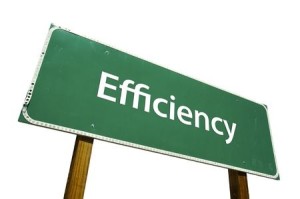Why Efficient People Work At Efficient Companies
 The very nature of business is to produce something at a profit. For a business to survive over the long-term means revenues must exceed expenses.
The very nature of business is to produce something at a profit. For a business to survive over the long-term means revenues must exceed expenses.
Yet, we all know that many companies lose money, some year after year. Without the injection of fresh capital (cash) they struggle to survive. Sadly, many simply close their doors, putting a lot of great people out of work.
So why do some companies survive while others go under? One reason is an understanding of the value of efficiency.
The Value of Efficiency
As a differentiating value, Efficiency means skillfulness in avoiding wasted time and effort; careful use of resources.
Some people assume that efficiency is naturally built into the DNA of a business. The reality is that it’s more rare than spotting a Florida panther. Efficiency is neither natural nor sustainable on its own.
Sometimes efficiency is forced upon a business through outside rules and regulations. We see this when governments create restrictive policies, such as water conservation, mining restrictions, or even the need to license wireless frequencies.
A more productive way is to inject the value of efficiency into the organizational culture. This is what a few successful companies have done.
Defining Efficiency
Here are 4 large companies that have embraced efficiency as a core value, and how they define it.
Micro Technology outlines six expected behaviors, instead of specific values. One of them is: Relentlessly Focus on Efficiency, which they define as follows:
Being relentlessly focused on efficiency requires a continuous improvement mindset. A conscious effort toward continuous improvement is critical to your personal and professional success.
Philip Morris International highlights Efficiency as one of their five values that they look for in potential employees. They define this as follows:
Our employees strive for excellence through efficient work habits and skillful performance. With a combination of well planned processes, smart priorities, and agile problem solving, our people enjoy doing the job, and doing it right. The results are often impressive.
Williams, a large oil & gas company, includes Efficiency & Effectiveness as one of their 10 core values. While I feel these two terms don’t belong together – as one has to do with doing things right and the other with doing the right thing – Williams’ definition shows they are clearly focused on efficiency:
We continuously collaborate with our customers and within our teams to discover and apply safer, better, faster and more cost-efficient ways to provide the services our customers value.
Bayer AG includes Efficiency as one of their four core values. In defining this value, they list 7 key points:
- Manage resources smartly
- Focus on activities that create value
- Do things simply and effectively
- Deliver with appropriate costs, speed and quality
- Speed up good decision-making
- Be accountable for consistent execution
- Collaborate for better solutions
In all cases, the focus is on employee behavior. The leaders of these companies know that their very survival is determined by their people. So, by including efficiency as a core value means these companies are more likely to attract people who care about this value.
In other words, people who love efficiency tend to work for efficient companies. A key benefit for both employees and the company is knowing it will likely survive for a long time.
When is efficiency helpful or harmful for the success of a business?
Today’s value was selected from the “Pragmatism-Prudence” category, based on the e-book Developing Your Differentiating Value.







